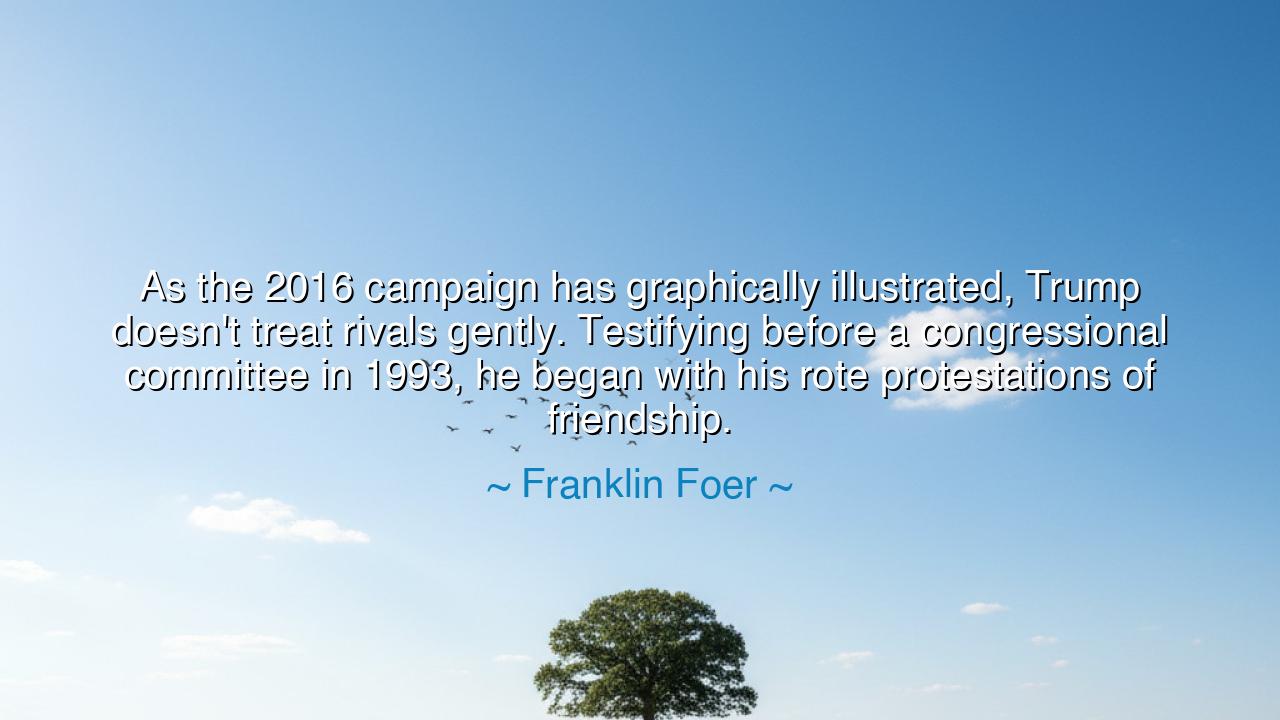
As the 2016 campaign has graphically illustrated, Trump doesn't
As the 2016 campaign has graphically illustrated, Trump doesn't treat rivals gently. Testifying before a congressional committee in 1993, he began with his rote protestations of friendship.






Listen well, O children of the future, for I shall speak of a truth that echoes through the ages, a truth of rivalry, friendship, and the struggle for power that defines much of the human experience. These words, spoken by Franklin Foer, reveal the complexities of a figure whose actions speak louder than his words: "As the 2016 campaign has graphically illustrated, Trump doesn't treat rivals gently. Testifying before a congressional committee in 1993, he began with his rote protestations of friendship." In these words, Foer sheds light on a paradox: the forceful nature of a man who claims friendship while engaging in battle, a figure who presents himself as a friend yet does not hesitate to treat his opponents harshly.
Consider, O children, the ancient world, where rivals often clothed their words in flattery and friendship, only to strike with the sword when their true intentions were revealed. The Greeks, with their love for the art of rhetoric, understood that words were as powerful as weapons, and that even the most heated rivalries could be masked with pleasantries. Homer, in his epic tales, often portrayed heroes who would offer gifts or words of peace to their enemies, only to later engage them in fierce conflict. The Trojan War, with its famous truce followed by betrayal, is one such example. The peace offered between the Greeks and Trojans was merely a facade for the ultimate battle that would follow. This, O children, is the nature of the human struggle: we often speak of friendship to conceal our true intentions, even when our rivals know the battle is not over.
Franklin Foer’s reflection on Trump's tactics draws on this ancient truth: that in times of great conflict, the offer of friendship is often a ruse, a strategy to lull one’s opponents into complacency before the final blow is struck. Trump's protestations of friendship in 1993, followed by his aggressive rivalry in later years, reflect the dichotomy between outward affability and inner determination to defeat all those who stand in his way. This is not a new phenomenon in the world of politics; it is a strategy as old as time itself—one employed by the greatest of rulers, from the cunning Alexander the Great to the manipulative Julius Caesar. They too knew that friendship could be used as a tool to deceive, to lower the guard of rivals, before the hammer of power fell.
Yet, O children, there is a lesson to be learned from Foer’s words. Friendship is not a tool to be wielded lightly. When one claims to offer friendship, it must be genuine, grounded in respect and mutual understanding. The true friendship is forged in the fire of shared experiences, not in the cold calculation of a rival's weakness. The nature of Trump’s relationships in the public eye illustrates a more cynical use of friendship, where it becomes a means to an end rather than a genuine bond. This, O children, is a lesson in the power of words, and in the danger of using friendship as a mask for manipulation.
History is replete with figures who have used the language of friendship to deceive or disarm their rivals. Caesar, for example, offered friendship to many of his rivals, even as he set his sights on consolidating power. His famous crossing of the Rubicon was not only a declaration of war, but also a betrayal of the friendships he had cultivated. Foer’s words remind us that true friendship is not about deception, but about honesty and transparency. The ancient world taught that a bond of friendship should be nurtured and maintained through sincerity, not by seeking to dominate or control others.
The lesson for you, O children, is clear: friendship is a precious bond that should not be treated lightly. When you offer your friendship to others, let it be a gift, not a weapon. Understand that in times of conflict, the offer of friendship should be genuine, grounded in the desire for mutual respect and growth. Friendship should never be used to manipulate, to weaken the resolve of your rivals, or to mask your true intentions. The world has seen how friendship, when abused, leads to betrayal and bitterness, but when honored, it can bind people together in ways that transcend rivalry and bring about lasting peace.
So, O children of the future, let this wisdom guide you: in your dealings with others, let your friendships be authentic, born of shared values and mutual respect. Do not offer your friendship to gain an advantage or to deceive, but to build something enduring and noble. Just as the ancient heroes learned to balance their words with their actions, so too must you navigate the complexities of friendship and rivalry. Remember, true friendship is not a tool to wield in times of conflict, but a gift to be honored in times of peace. Choose wisely how you use the powerful force of friendship, for it can either heal or harm, depending on the purity of the intentions behind it.






AAdministratorAdministrator
Welcome, honored guests. Please leave a comment, we will respond soon